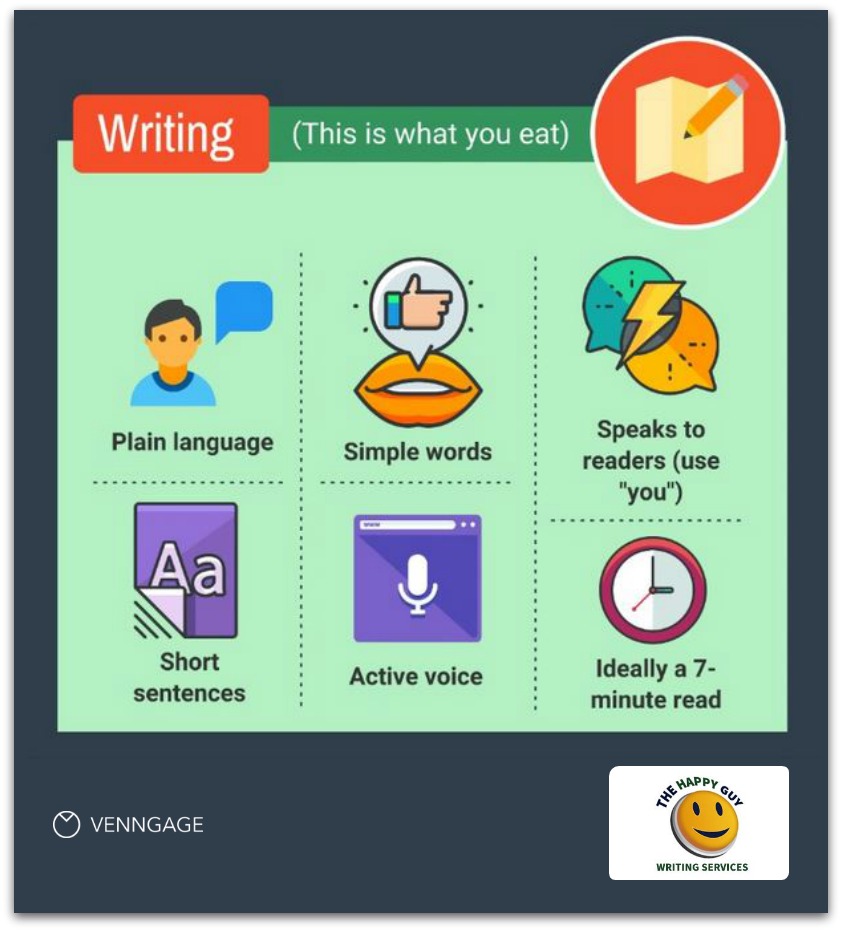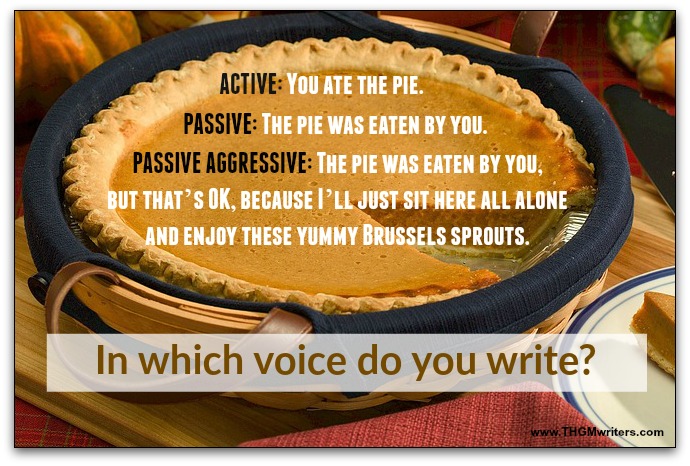The way you write your blog posts, in plain language and easy to read, will determine whether anybody reads what you write. Here is how to keep people reading.
NOTE: This is Part 3 of the “mouth-watering blog posts” series. You have a great idea and the ideal headline, but you’ll need a bit more than that.
How you write is not as important as what you write. For instance, the quality of your writing is not as important as what your headline says.
But if you come up with the best idea for a blog post and give it the most deliciously seductive headline, all that work will be wasted if people leave your page after a few seconds.
Why would they leave?
- If it’s not obvious right away that what you wrote matches what they came for
- If the writing is sloppy, with poor spelling and bad grammar
- If it’s hard to read, with long rambling sentences – if it takes work to read
Write your blog post in plain language
Your top job when you write your blog post is to be clear. You want your reader to understand what you write, and it had better be what they came to your page for.
Get to the point. In very clear language, make sure that they know what the post is about.
To do this, try to write to a Grade 8 reading level or lower.
I am writing to nuclear physicists. They have 20 years of education. Can I write to a Grade 20 reading level for them?
This is a superb question, because you should always write to your audience using the words they will understand best and the frame of reference they will relate to. And that includes some nuclear technology words, such as:
- microsievert
- void coefficient of reactivity
- stochastic effects
But the answer is, “No.” You should still write to a Grade 8 level for an audience of nuclear physicists. They read long, complex, mind-twisting, headache-inducing, torture-chamber texts when they have to. When they don’t have to, why would they continue the torture?
The only difference between writing for the public at large and writing for nuclear physicists is that you might have to use some big, technical words, like those tongue twisters I mentioned above. That’s OK. The in-between words should still be simple. In fact, the more big, complex words you have to use for technical or accuracy reasons, the more important it is to use small, simple Grade 8 words between them.
And all the other guidelines of plain language should absolutely apply.
Write with simple words
Aside from technical words that might be needed for a specific topic and a specific audience, you should always use the simplest, most common words. These are the words people use when they talk. These are the words people will understand without having to stop or slow down to think.
If people have to read slower to think about what they are reading, you’ve lost them. The only thing that should make people stop and think, or slow down and think, are your amazing, show-stopping ideas.
Write in short sentences
This should be easy. This is a short sentence. But it’s often not that easy. People can get quite long-winded when they write.
Sometimes, it’s because they add a lot of clauses that begin with “because”, “given that”, “not only”, “despite”, “in light of”, “since”, etc. These are just a few of the words writers use to weld multiple sentences together, creating a beast no reader wants to tame.
So, you had best tame the beast for them. Here is how.
Many times, these descriptive or contextual clauses just repeat information mentioned earlier. If it was last mentioned a couple chapters earlier, you might want to repeat it. If it was mentioned just a couple paragraphs earlier, this “context” is already there. Unless you made a purposeful break from the earlier information, it is already context in your readers’ minds. No need to repeat it. Just take it out!
On the other hand, if you had not mentioned the context before, or if was last mentioned a couple chapters ago, you will need to remind readers. But you don’t need to remind readers of all the context in the same sentence.
In fact, follow this golden rule:
Each sentence tells the reader one thing. Just one. So divide those multi-clause sentences into two or three. One complete thought in each shorter sentence. Let one thought follow the other, but let people recognize each one on its own. That’s how to communicate clearly.
Sometimes, sentences are long and convoluted because they contain lists. Some of those lists are simple, with several short items. For instance, your shopping list:
- bread
- milk
- cereal
- fruit
When you put these into a sentence, it’s not too hard to read.
But sometimes, the items are long and might even be complex in themselves. For instance, the reasons for hiring a ghostwriter:
- to get started, because you never seem to have the time to begin
- to get the job finished sooner than if you do it yourself
- to ensure professional quality English that is easily understood by the reader
- to organize the material logically, so that the ideas will flow well for the readers
Try putting those four items into a sentence, separated by commas, and read it 10 times fast.
Exactly – that’s a mess, and readers don’t want to struggle through a mess.
Write your blog in the active voice
This is a very simple concept. We learn to speak and read English using the active voice, which places words in this order:
- subject
- verb
- object
- (qualifier)
For example:
- He ate the bread.
- You met her.
Or with a qualifier:
- He ate the bread at noon.
- You met her at the store.
Because this is how we learn English, this is how we most easily read it.
If we use the passive voice, it not only sounds strange, but it is harder to read. We have to stop and ask ourselves, “Wait, who is doing what to whom?” For example, we would not say:
- The bread was eaten by him.
- She was met by you.
You can almost always eliminate the passive voice, so do it now.
Speak to the reader when you write
A blog post is not a theoretical academic paper postulating on the possibility that some organism might have evolved in the Jurassic era.
A blog post is a conversation with your readers. Speak to the reader. Use the imperative voice. That’s the command, as when I said to you, “Speak to the reader.”
Your readers are the centers of their universes, so make them the center of your blog. I wrote about maximizing the effect of pronouns here.
Don’t ramble forever
Seven minutes is tops; less is more. If you run over five minutes of reading, you risk putting your readers to sleep. Chances are you have enough material for two or more blog posts.
Or you could write a book.
But first, edit your draft.
You might find that some of the information can be collapsed and made more concise. Your readers will love you for making it more concise.
There might be some things you don’t need to explain, because there is already good information on the Internet to link to. Why clutter up your blog post with other people’s ideas, when you obviously have so many of your own?
All these approaches can improve your blog posts to increase the reading, engagement and sharing. But, of course, your idea has to be worth reading in the first place.
And you would not be blogging if you weren’t overflowing with amazing ideas, right?
Want to learn more?
Read the free ebook How to create mouth-watering blog posts, based on this Infographc.




Hi David,
Glad to see the next post on this series, In fact I was eagerly waiting for this piece the second one in line.
Glad to know more tips on creating mouth-watering recipes for creating blog posts.
Yes, the simple and understandable words are the main key here, yes, simple and small paragraphs will really give the readers a kind of relaxation in reading and am sure that will grasp their understanding too.
Great share.
Glad I found this today on the pages of BIzSugar.
Keep writing.
I am bookmarking it for yet another leisure reading. of course, I did a quick reading but need to go thru well again to grasp more! 🙂
Have a great week ahead.
Best
~ Phil
Hi David, i love your pie picture and how we use the different ways of writing. I’m always working on that passive writing per Yoast SEO. That picture really helps keep me on track!
Thanks for all the tips and reminders here David. have a great day.
Simple wins David. Every time. Be clear, concise and focused in all you do guys. Power post buddy.
Ryan
Nice tips on writing a blog post.
I agree with a friend of mine, he said that content is not king but context.
When I first started out with blogging, I made use of some pretty advance words just to prove intelligence and all that. Not long I discovered i was finding it hard understanding my own posts. How would my readers understand if I’m struggling with understanding myself? Then as I went deeper into the world of writing and blogging, I learnt how simplicity is the winning strategy. And the sole aim of my blog was to pass information, not confuse the readers. Since that time, I’ve seen a spike in positive feedbacks and readers now appreciate what I put out. Simplicity is the game changer.